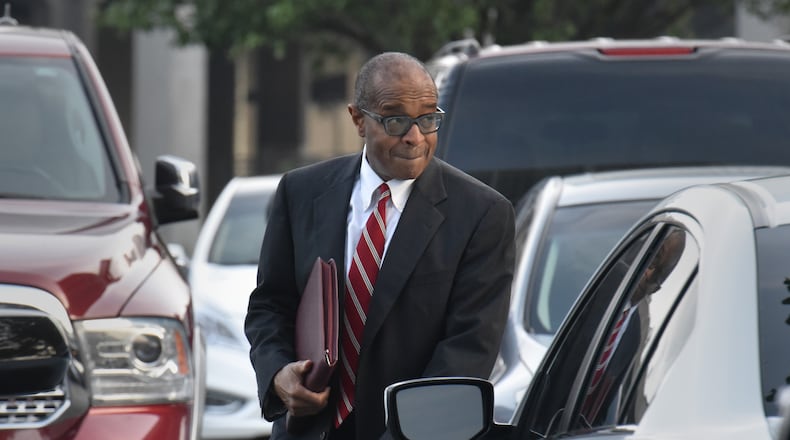Pastor Mitzi Bickers will be allowed to introduce some evidence in her defense that a key government witness worked as an informant for the FBI to try to bribe public officials, a federal judge ruled Monday in her corruption trial.
U.S. District Court Judge Steve C. Jones ruled Bickers can question contractor Elvin “E.R.” Mitchell Jr. about his cooperation with the FBI starting in 2006, how long he was an informant and whether Mitchell wore a wire and had his phones wiretapped.
The defense can also address on cross-examination whether Mitchell owed Bickers money during the time as an informant and whether he discussed his cooperation with Bickers.
The order opens a possible avenue for Bickers’ lawyers to establish reasonable doubt about the bribery charges. The defense is expected to argue at least some of the money Bickers received from two city contractors weren’t bribes as the government alleges but compensation Bickers was owed for legitimate public relations work.
But Jones also granted a government motion to prevent the defense from introducing evidence Mitchell worked as a paid informant because there isn’t evidence to support a defense allegation Mitchell was on the government’s payroll.
The judge warned Bickers’ attorneys not to go too far in their exploration of Mitchell’s cooperation with the government. If they do, it might open the door for prosecutors to introduce new evidence against the pastor.
Bickers, a political consultant who helped Kasim Reed win his first run for mayor in 2009, is accused of orchestrating a cash-for-contracts scheme involving Mitchell and Charles P. Richards Jr., who received some $17 million in city business combined from 2010 to 2014.
An indictment alleges Bickers received some $2 million in bribes to help steer contracts to the men.
In a hearing Friday outside the presence of the jury, defense attorney Drew Findling alleged Mitchell worked as a paid FBI informant under an agreement to avoid prosecution in an unrelated matter.
Credit: Lucy Luckovich
Credit: Lucy Luckovich
In 2006, Mitchell reached a $1.7 million civil settlement with the Fulton County Schools over alleged overbilling. Those alleged acts triggered a federal criminal investigation. But Mitchell was not charged in the matter.
Findling alleged Mitchell worked with the FBI from 2006 to 2012, years that overlap some of the years Mitchell admitted to paying bribes to Bickers. Findling alleged the FBI paid Mitchell $50,000 per year.
The defense has already tried to lay a foundation that Mitchell is untrustworthy. Evidence Mitchell worked as a paid informant might bolster defense efforts to establish reasonable doubt or potentially an entrapment defense, but the judge nixed that line of questioning.
Federal prosecutors said documents cited by the defense did not support the allegation Mitchell was a paid informant, and the contractor did not have a formal non-prosecution agreement. Prosecutors said Mitchell’s cooperation ended in 2007, about three years before the alleged bribery scheme.
Paying Mitchell was apparently discussed by the FBI, but the judge wrote that no evidence was presented Mitchell was paid.
Jones said he could not determine if Mitchell in fact had a formal non-prosecution agreement, but Mitchell did cooperate in an apparent effort to secure such a deal.
A document cited by Jones said Mitchell would meet with public officials to try to get contracts “and other favorable treatment for bribe payments and other benefits. (Mitichell) will also hire marketing consultants, who are associated to the public officials, that may operate as bagmen to accept bribe payments on behalf of the public officials.”
Findling said Friday that Bickers worked for Mitchell in a public relations role and Mitchell had the government’s approval to hire a person for such work. The government countered that Mitchell hired Bickers before it was approved.
Mitchell has a history of litigation, which the defense is expected to hammer.
Keep Reading
The Latest
Featured




